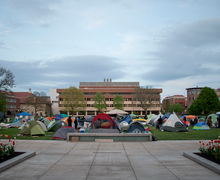USen discusses committee reimagining process, takes feedback from attendees
Abbey Fitzpatrick | Contributing Photographer
Because USen does not have enough members to fulfill its bylaw requirements of committees, it is working to merge committee operations. A Bylaws Ad Hoc Committee was established to review the Senate committee structure and recommend changes.
Get the latest Syracuse news delivered right to your inbox.
Subscribe to our newsletter here.
UPDATED: Feb. 8 at 1:50 p.m.
Syracuse University community members asked questions and raised concerns about the University Senate’s ongoing committee reimagining project and issues of tenure and pay for professors at its annual open forum Wednesday afternoon.
The forum, which the Senate holds each spring semester, adopts a different format than its typical monthly meetings. With no scheduled business, non-senator faculty and committee members, along with senators, are able to provide input. Instead of hearing from committees and passing resolutions, the forum allows attendees to speak to the Senate, chancellor and provost.
Throughout the meeting, multiple undergraduate students and faculty raised concern and confusion regarding the committee reimagining process. Participants gave opinions on specific potential committee mergers and the feedback gathering done to propose them. Following a request to clarify the overall process, Agenda Committee Chair Kira Reed summarized the last few years of work regarding the resolution.
“It’s been a whole University Senate process. It’s no one person. It’s not one committee. Everybody’s been engaged in that,” Reed said.
Because the Senate does not have enough members to fulfill its bylaw requirements of committees, it is working to restructure them by merging existing committee operations, Reed said. In November 2021, a Bylaws Ad Hoc Committee was established to “conduct an overall review of Senate committee structure” and recommend changes.
According to the Ad Hoc Committees’ website, the review was the result of a Senate standing committee audit conducted in spring 2021. The Bylaws Ad Hoc Committee is now tasked with improving the Senate’s efficiency by consolidating and adjusting its multiple committees.
Reed confirmed the Senate’s Student Life and Athletic Policy Committees will not merge, but that it will conduct a survey to gather feedback to reassess the Student Life Committee in an effort to increase engagement and make it more “modern.”
Along with asking for updates on the committee reimagining process, multiple SU faculty members in the Senate highlighted their concerns surrounding teacher salaries and tenure for the most “vulnerable” faculty members on campus.
“I think one of the most pressing issues right now facing the university is the dilution of tenure that is occurring,” said Matthew Mulvaney, an associate professor in the David B. Falk College of Sport and Human Dynamics. “In particular, the non-tenure ability of the vast proportion of teaching faculty who are expanding in their ranks.”
Senators also said they were concerned about how rising inflation rates and the overall cost of living may impact SU’s lowest-paid faculty.
“It puts us in a bind if we’re not providing cost of living increases, particularly because there are some folks … here who make a lot of money,” said Biko Gray, a senator and associate professor in SU’s religion department. “I’m wondering about folks who don’t necessarily make as much money, particularly given the fact there’s this process by which people are trying to minimize the pay gap.”
Reed said the Senate will address some financial concerns during its March meeting, which will focus on the faculty manual, a document on the rights, responsibilities and governing of faculty. She also told attendees to contact either the Academic Freedom Tenure and Professional Ethics Committee or the Services to the Faculty and Staff Committee if they had any further concerns.
Tanner Boshart, an undergraduate senator on the Academic Affairs Committee, updated the Senate on its collaboration with SU’s Student Association and undergraduate senate caucus to “improve classroom affordability.”
Boshart outlined plans to encourage faculty to utilize open-source course materials, including websites and textbooks, and make their syllabi available before course registration to “improve transparency with students in any way possible.”
The Athletic Policy and Race, Ethnicity, Equity and Inclusion Committees are on the agenda for the Senate’s next meeting on Feb. 21, according to its website.
At the last Senate meeting, Reed said the Honorary Degrees Committee would present a month earlier than originally scheduled, moving them from March to late February. The Honorary Degrees Committee is now slated to present on Feb. 21.
Published on February 8, 2024 at 12:17 am
Contact Griffin: [email protected]





